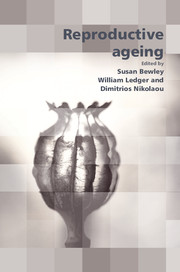Book contents
- Frontmatter
- Contents
- Participants
- Declarations of personal interest
- Preface
- SECTION 1 BACKGROUND TO AGEING AND DEMOGRAPHICS
- 1 Ageing: what is it and why does it happen?
- 2 Culture and reproductive ageing
- 3 Ageing
- 4 What has happened to reproduction in the 20th century?
- 5 Trends in fertility: what does the 20th century tell us about the 21st?
- 6 Demographics
- SECTION 2 BASIC SCIENCE OF REPRODUCTIVE AGEING
- SECTION 3 PREGNANCY: THE AGEING MOTHER AND MEDICAL NEEDS
- SECTION 4 THE OUTCOMES: CHILDREN AND MOTHERS
- SECTION 5 FUTURE FERTILITY INSURANCE: SCREENING, CRYOPRESERVATION OR EGG DONORS?
- SECTION 6 SEX BEYOND AND AFTER FERTILITY
- SECTION 7 REPRODUCTIVE AGEING AND THE RCOG: AN INTERNATIONAL COLLEGE
- SECTION 8 FERTILITY TREATMENT: SCIENCE AND REALITY – THE NHS AND THE MARKET
- SECTION 9 THE FUTURE: DREAMS AND WAKING UP
- SECTION 10 CONSENSUS VIEWS
- Index
3 - Ageing
from SECTION 1 - BACKGROUND TO AGEING AND DEMOGRAPHICS
Published online by Cambridge University Press: 05 February 2014
- Frontmatter
- Contents
- Participants
- Declarations of personal interest
- Preface
- SECTION 1 BACKGROUND TO AGEING AND DEMOGRAPHICS
- 1 Ageing: what is it and why does it happen?
- 2 Culture and reproductive ageing
- 3 Ageing
- 4 What has happened to reproduction in the 20th century?
- 5 Trends in fertility: what does the 20th century tell us about the 21st?
- 6 Demographics
- SECTION 2 BASIC SCIENCE OF REPRODUCTIVE AGEING
- SECTION 3 PREGNANCY: THE AGEING MOTHER AND MEDICAL NEEDS
- SECTION 4 THE OUTCOMES: CHILDREN AND MOTHERS
- SECTION 5 FUTURE FERTILITY INSURANCE: SCREENING, CRYOPRESERVATION OR EGG DONORS?
- SECTION 6 SEX BEYOND AND AFTER FERTILITY
- SECTION 7 REPRODUCTIVE AGEING AND THE RCOG: AN INTERNATIONAL COLLEGE
- SECTION 8 FERTILITY TREATMENT: SCIENCE AND REALITY – THE NHS AND THE MARKET
- SECTION 9 THE FUTURE: DREAMS AND WAKING UP
- SECTION 10 CONSENSUS VIEWS
- Index
Summary
Peter Braude: I have always believed that women go into menopause because they live too long. The issue is whether the climacteric and the postmenopause years are physiological. It seems to me that menopause is a pathological phenomenon and should be dealt with as such. Therefore saying that ‘we don't want HRT’ or ‘we need HRT’ is fallacious because it is not based on understanding physiology.
Jane Preston: It is interesting that you say that. Humans are not alone in having some kind of climacteric, although we have the longest post-reproductive lifespan of all the animals. Some other primates do seem to have a short period of cessation of fertility towards the end of life. The suggestion is that the animal has to achieve a certain length of lifespan in order for that to be seen. With increasing lifespan, primates gradually do show that increase in the post-reproductive lifespan. If any of them were to live close to our age then the suggestion is that menopause would happen. Whether it is pathology or not, I don't know. Data from women who have late menopause suggest they have better health fitness afterwards. That is, they live longer and appear to be healthier. One of the theories is about the need for grandmothers to be available to nurture their children.
Peter Braude: But what happens in primates — gorillas, chimpanzees and so on? Don't the older ageing females tend to get hounded out of packs?
- Type
- Chapter
- Information
- Reproductive Ageing , pp. 27 - 32Publisher: Cambridge University PressPrint publication year: 2009
- 1
- Cited by

